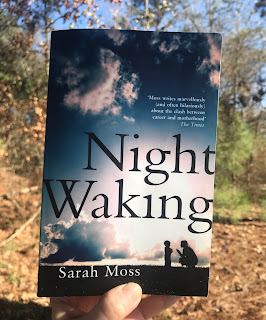In Night Waking, Moss tells the story of Oxford history fellow Anne Bennett, inextricably trapped in motherhood and an exile of sorts on an isolated Scottish island. She never has enough time to work on her book (an academic work on the history of childhood), or enough sleep, or enough support from her husband whose priority is counting puffins, and (though she would never admit this or maybe even realize it) she is addicted to the extent of her young sons’ need for her.
Anne’s story is interspersed with excerpts from her writing, quotes from people like Anna Freud whose works are referenced in her book, and the history of the (fictional) island of Colsay on which her family is living. Throw in a police investigation regarding the bones of an infant that turn up in the garden and you’ve got yourself a pretty intriguing mix.
Though the book has elements of mystery that any good police investigation would indicate, the dominating force of this story is Anne’s fraught relationship with motherhood. And Moss’s writing is so intensely real that I had to remind myself I was not Anne, and that I had no cause to be irritated with my husband who (quite unlike Anne’s Giles) is a superstar of a husband and father and doesn’t care a lick about puffins.
I wonder why I am so partial to female authors? Though I have certainly enjoyed books written by men, my list of favorite authors is (with one obvious exception) almost exclusively female. I think it must be, as happened with this book, that a female writer is naturally more able to write in a way that connects with my female mind.









No comments:
Post a Comment